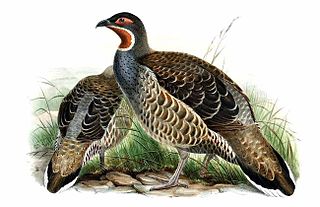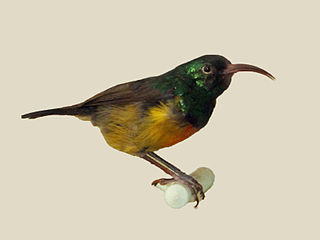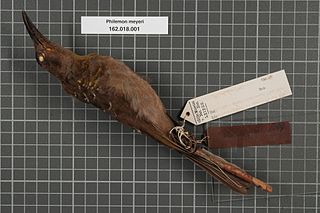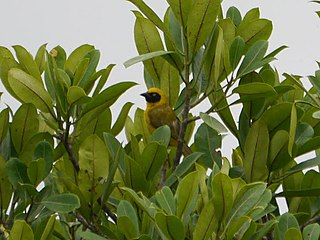
The friarbirds, also called leatherheads, are a groups of 18 relatively large honeyeaters in the genus Philemon. Additionally, the single member of the genus Melitograis is called the white-streaked friarbird. Friarbirds are found in Australia, Papua New Guinea, eastern Indonesia, and New Caledonia. They eat nectar, insects and other invertebrates, flowers, fruit, and seeds.

The Temminck's tragopan is a medium-sized, approximately 64 cm long, pheasant in the genus Tragopan. The male is a stocky red-and-orange bird with white-spotted plumage, black bill and pink legs. The male's display features include bare blue facial skin, inflatable dark-blue lappet and horns. The females are a white-spotted brown with blue circular eye skin.

Chestnut-throated monal-partridge, also known as chestnut-throated partridge or Verreaux's monal-partridge, is a bird species in the family Phasianidae. It is found only in central China. Its natural habitat is boreal forest.
Grauer's swamp warbler is a species of Old World warbler in the family Locustellidae. It is native to the Albertine Rift montane forests. Its natural habitats are freshwater lakes and freshwater marshes. It is threatened by habitat loss.

Sclater's lark is a species of lark in the family Alaudidae. It is found in Namibia and South Africa. Its natural habitat is subtropical or tropical dry shrubland. It is threatened by habitat loss.

Swinhoe's rail is a species of bird in the family Rallidae occurring in northeastern Asia. It was known only in two locations in Manchuria and southeastern Siberia, separated by more than 1000 km; however, in 2018, a new breeding population was found in the Amur region, situated between the two. Its natural habitats are swamps, freshwater lakes, freshwater marshes, and arable land. It is the world's smallest rail at 13 cm (5.2 in) and 24.5 grams. It is threatened by habitat loss, and considered a vulnerable species on the IUCN Red List.

Cabanis's bunting is a species of bird in the family Emberizidae.

Braun's bushshrike is a species of bird in the family Malaconotidae. It is endemic to Angola. An alternative name for this bird is the orange-breasted bushshrike, but the English name is also used for Chlorophoneus sulfureopectus.

Blanford's snowfinch or the plain-backed snowfinch, is a species of bird in the sparrow family.

Chapin's flycatcher is a bird species in the Old World flycatcher family (Muscicapidae). It is native to the Albertine Rift montane forests. The Itombwe flycatcher was formerly considered conspecific.

Loveridge's sunbird is a species of bird in the family Nectariniidae. It is endemic to Tanzania.

The silver-crowned friarbird is a species of bird in the family Meliphagidae.It is endemic to northern Australia, including Queensland.

The Morotai friarbird or dusky friarbird is a species of friarbird in the honeyeater family Meliphagidae. It is a dark brown bird with pale undersides. The area around the eye is bare and pink. It is around 30 cm long. The species is mimicked by the dusky-brown oriole, which is almost identical in appearance, a situation that has arisen in many species of orioles and friarbirds that exist in the same habitat. This is thought to reduce aggression by the friarbirds against the smaller orioles. It is endemic to the island of Morotai in North Maluku, Indonesia.

The Timor friarbird or plain friarbird is a species of bird in the family Meliphagidae.

Meyer's friarbird is a species of bird in the family Meliphagidae. It is found throughout New Guinea. Its natural habitat is subtropical or tropical moist lowland forests.

The Buru friarbird or black-faced friarbird is a species of bird in the family Meliphagidae. It is endemic to the island of Buru in the Maluku Islands, Indonesia.

The Seram friarbird, also known as the grey-necked friarbird, Ceram friarbird, grey-necked honeyeater and gray-necked honeyeater, is a species of bird in the family Meliphagidae. It is endemic to Indonesia where it occurs on Seram Island in the Maluku Islands. Its natural habitats are subtropical or tropical moist lowland forests and subtropical or tropical mangrove forests. They are common and conspicuous and often in small groups of up to four individuals.

Bannerman's weaver is a species of bird in the weaver family, Ploceidae. It is native to the Western High Plateau. Its natural habitat is subtropical or tropical moist montane forests. It is threatened by habitat loss.

Temminck's seedeater is a species of bird in the family Thraupidae.

Ward's trogon is a species of bird in the family Trogonidae. Its range includes the northeastern parts of the Indian subcontinent stretching eastwards to Southeast Asia. It is found in Bhutan, India, Tibet, and Myanmar. It also has a disjunct population in northern Vietnam, but there are no recent records from there. Its natural habitats are temperate forests and subtropical or tropical moist lowland forests. It is threatened by habitat loss.



















